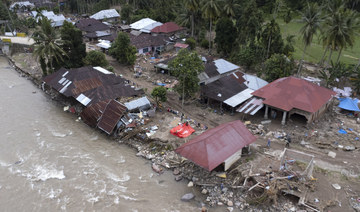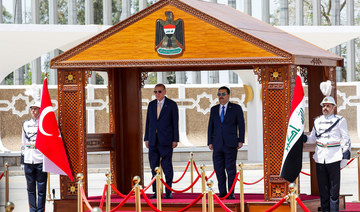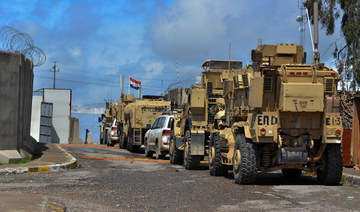JAKARTA: The US has designated the Daesh-linked Indonesian extremist network that carried out a deadly attack in Jakarta last year as a terrorist organization.
The State Department said on Tuesday that Jamaah Ansharut Daulah (JAD) is “a terrorist group based in Indonesia that was formed in 2015 and is composed of almost two dozen Indonesian extremist groups” who are followers of Daesh.
The US also announced sanctions against four militants as part of efforts to cut off Daesh’s access to the international financial system.
US officials said militants from JAD carried out a gun and suicide attack in the Indonesian capital in January last year that left four civilians and four attackers dead in the first Daesh attack in Southeast Asia.
The attack was financially supported by an Daesh militant in Syria, they said.
The State Department said the consequences of being designated a terrorist group included a ban on US citizens engaging in business with JAD, and the freezing of any property linked to the group in America.
JAD has been connected to a series of other plots in Indonesia, including a firebomb attack on a church that killed a toddler and a plan to launch a Christmas-time suicide bombing which was foiled when the militants planning the attack were killed.
Among the four militants to be sanctioned are two Indonesians.
Bahrumsyah is an Indonesian fighting with Daesh in Syria who is believed to lead a Southeast Asian unit of radicals, and who has sought to order attacks back home and transferred funds to militants.
The other Indonesian militant is Aman Abdurrahman, a jailed radical who authorized the Jakarta attack and is considered the de facto leader of all Daesh supporters in Indonesia, according to US officials.
Despite being in prison since 2010, he has recruited militants to join Daesh, is thought to have been in communication with leaders of the militant group, and is the main translator for Daesh propaganda in Indonesia.
The Treasury also slapped sanctions on two Australians — Neil Christopher Prakash, Daesh’s most senior Australian recruiter, and Khaled Sharrouf, who has appeared in photographs holding the severed heads of people executed by the militants.
Indonesia, the world’s most populous Muslim-majority country, has long struggled with militancy and has been hit by a series of attacks in the past 15 years, including the 2002 Bali bombing that left 202 people dead.
A crackdown had weakened the most dangerous networks, but fears have been growing of a resurgence in militancy after hundreds of Indonesians flocked to the Middle East in recent years to join Daesh.
US names Indonesian extremist network a terror group
US names Indonesian extremist network a terror group

At least five migrants died during attempt to cross English Channel - La Voix du Nord
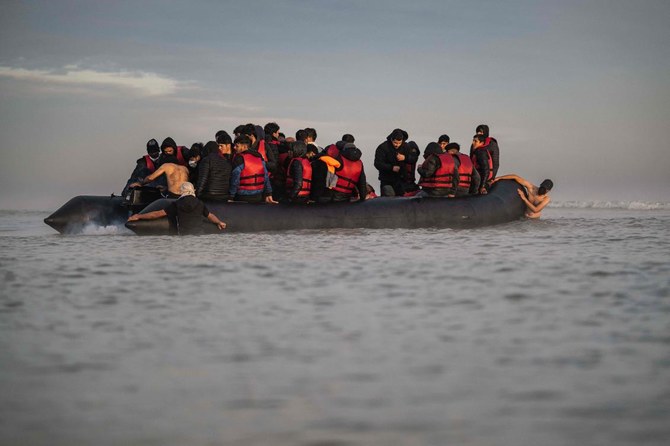
- People smugglers typically overload rickety dinghies, leaving them barely afloat and at risk of being lashed by the waves
The French coast guard confirmed there was a failed attempt to cross the Channel and said police were operating at a beach following the incident on Tuesday morning, adding there were several ‘lifeless bodies’.
Local police did not immediately reply to a Reuters request for comment.
The coast guard spokesperson said its agents were still operating at sea on Tuesday morning after what the official called a ‘busy’ morning, with several crossing attempts.
The Channel between France and Britain is one of the world’s busiest shipping lanes and currents are strong, making the crossing on small boats dangerous.
People smugglers typically overload rickety dinghies, leaving them barely afloat and at risk of being lashed by the waves as they try to reach British shores.
Asia hit hardest by climate, weather disasters in 2023— UN
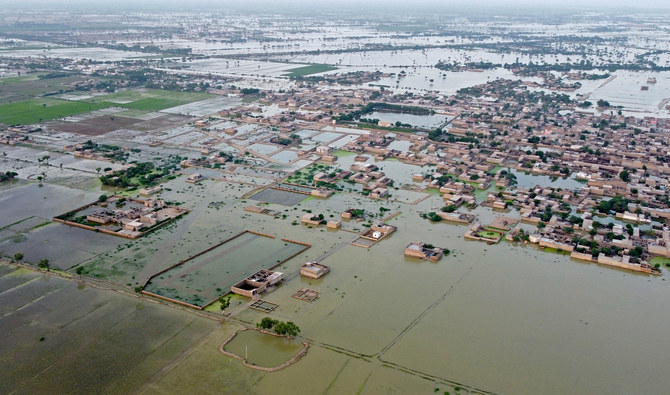
- Climate change exacerbated severity of weather disasters last year, sauys World Meteorological Organization
- 79 disasters, mostly floods and storms, associated with water-related weather hazards were reported in Asia in 2023
Geneva: Asia was the world’s most disaster-hit region from climate and weather hazards in 2023, the United Nations said Tuesday, with floods and storms the chief cause of casualties and economic losses.
Global temperatures hit record highs last year, and the UN’s weather and climate agency said Asia was warming at a particularly rapid pace.
The World Meteorological Organization said the impact of heatwaves in Asia was becoming more severe, with melting glaciers threatening the region’s future water security.
The WMO said Asia was warming faster than the global average, with temperatures last year nearly two degrees Celsius above the 1961 to 1990 average.
“The report’s conclusions are sobering,” WMO chief Celeste Saulo said in a statement.
“Many countries in the region experienced their hottest year on record in 2023, along with a barrage of extreme conditions, from droughts and heatwaves to floods and storms.
“Climate change exacerbated the frequency and severity of such events, profoundly impacting societies, economies, and, most importantly, human lives and the environment that we live in.”
The State of the Climate in Asia 2023 report highlighted the accelerating rate of key climate change indicators such as surface temperature, glacier retreat and sea level rise, saying they would have serious repercussions for societies, economies and ecosystems in the region.
“Asia remained the world’s most disaster-hit region from weather, climate and water-related hazards in 2023,” the WMO said.
The annual mean near-surface temperature over Asia in 2023 was the second highest on record, at 0.91 degrees Celsius above the 1991-2020 average, and 1.87 C above the 1961-1990 average.
Particularly high average temperatures were recorded from western Siberia to central Asia, and from eastern China to Japan, the report said, with Japan having its hottest summer on record.
As for precipitation, it was below normal in the Himalayas and in the Hindu Kush mountain range in Pakistan and Afghanistan.
Meanwhile southwest China suffered from a drought, with below-normal precipitation levels in nearly every month of the year.
The High-Mountain Asia region, centered on the Tibetan Plateau, contains the largest volume of ice outside of the polar regions.
Over the last several decades, most of these glaciers have been retreating, and at an accelerating rate, the WMO said, with 20 out of 22 monitored glaciers in the region showing continued mass loss last year.
The report said 2023 sea-surface temperatures in the northwest Pacific Ocean were the highest on record.
Last year, 79 disasters associated with water-related weather hazards were reported in Asia. Of those, more than 80 percent were floods and storms, with more than 2,000 deaths and nine million people directly affected.
“Floods were the leading cause of death in reported events in 2023 by a substantial margin,” the WMO said, noting the continuing high level of vulnerability of Asia to natural hazard events.
Hong Kong recorded 158.1 millimeters of rainfall in one hour on September 7 — the highest since records began in 1884, as a result of a typhoon.
The WMO said there was an urgent need for national weather services across the region to improve tailored information to officials working on reducing disaster risks.
“It is imperative that our actions and strategies mirror the urgency of these times,” said Saulo.
“Reducing greenhouse gas emissions and adapting to the evolving climate is not merely an option, but a fundamental necessity.”
UN officials urge UK to reconsider plan to transfer asylum seekers to Rwanda
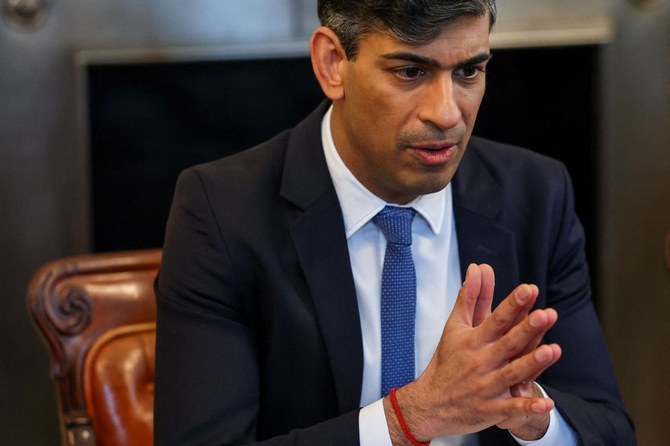
- UN called on the UK to instead take practical measures to address irregular flows of migrants and refugees
GENEVA: Two United Nations top officials on Tuesday called on the UK to reconsider its plan to transfer asylum seekers to Rwanda, warning the move would have a harmful impact on human rights and refugee protection.
In a joint statement, Filippo Grandi, the UN High Commissioner for Refugees, and Volker Turk, the UN High Commissioner for Human Rights, called on the UK to instead take practical measures to address irregular flows of migrants and refugees.
British Prime Minister Rishi Sunak promised on Monday to start sending asylum seekers to Rwanda within 10 to 12 weeks as the upper house of parliament passed legislation that had been delayed for weeks by attempts to alter the plan.
Asia hit hardest by climate, weather disasters in 2023:UN
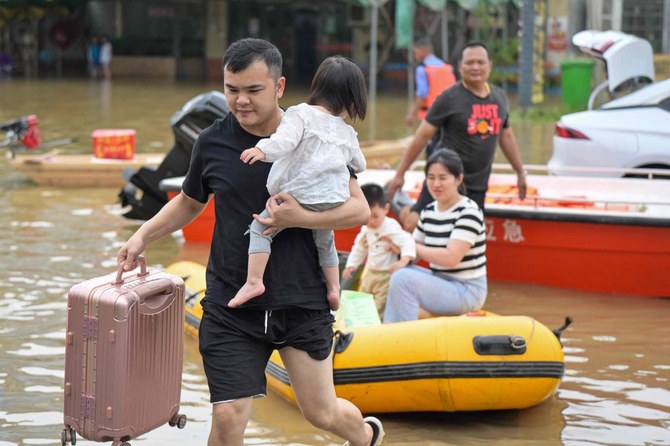
- UN’s weather and climate agency said Asia was warming at a particularly rapid pace
GENEVA: Asia was the world’s most disaster-hit region from climate and weather hazards in 2023, the United Nations said Tuesday, with floods and storms the chief cause of casualties and economic losses.
Global temperatures hit record highs last year, and the UN’s weather and climate agency said Asia was warming at a particularly rapid pace.
The World Meteorological Organization said the impact of heatwaves in Asia was becoming more severe, with melting glaciers threatening the region’s future water security.
The WMO said Asia was warming faster than the global average, with temperatures last year nearly two degrees Celsius above the 1961 to 1990 average.
“The report’s conclusions are sobering,” WMO chief Celeste Saulo said in a statement.
“Many countries in the region experienced their hottest year on record in 2023, along with a barrage of extreme conditions, from droughts and heatwaves to floods and storms.
“Climate change exacerbated the frequency and severity of such events, profoundly impacting societies, economies, and, most importantly, human lives and the environment that we live in.”
The State of the Climate in Asia 2023 report highlighted the accelerating rate of key climate change indicators such as surface temperature, glacier retreat and sea level rise, saying they would have serious repercussions for societies, economies and ecosystems in the region.
“Asia remained the world’s most disaster-hit region from weather, climate and water-related hazards in 2023,” the WMO said.
Ranging disasters
The annual mean near-surface temperature over Asia in 2023 was the second highest on record, at 0.91 degrees Celsius above the 1991-2020 average, and 1.87 C above the 1961-1990 average.
Particularly high average temperatures were recorded from western Siberia to central Asia, and from eastern China to Japan, the report said, with Japan having its hottest summer on record.
As for precipitation, it was below normal in the Himalayas and in the Hindu Kush mountain range in Pakistan and Afghanistan.
Meanwhile southwest China suffered from a drought, with below-normal precipitation levels in nearly every month of the year.
The High-Mountain Asia region, centered on the Tibetan Plateau, contains the largest volume of ice outside of the polar regions.
Over the last several decades, most of these glaciers have been retreating, and at an accelerating rate, the WMO said, with 20 out of 22 monitored glaciers in the region showing continued mass loss last year.
The report said 2023 sea-surface temperatures in the northwest Pacific Ocean were the highest on record.
Water-related hazards
Last year, 79 disasters associated with water-related weather hazards were reported in Asia. Of those, more than 80 percent were floods and storms, with more than 2,000 deaths and nine million people directly affected.
“Floods were the leading cause of death in reported events in 2023 by a substantial margin,” the WMO said, noting the continuing high level of vulnerability of Asia to natural hazard events.
Hong Kong recorded 158.1 millimeters of rainfall in one hour on September 7 — the highest since records began in 1884, as a result of a typhoon.
The WMO said there was an urgent need for national weather services across the region to improve tailored information to officials working on reducing disaster risks.
“It is imperative that our actions and strategies mirror the urgency of these times,” said Saulo.
“Reducing greenhouse gas emissions and adapting to the evolving climate is not merely an option, but a fundamental necessity.”
Jury deliberating in Iraq Abu Ghraib prison abuse civil case; contractor casts blame on Army

- Raisi said the killings by Israel in Gaza were being committed with the support of the United States and other Western countries
ALEXANDRIA, Virginia: A lawyer for the military contractor being sued by three survivors of the notorious Abu Ghraib prison in Iraq told jurors Monday that the plaintiffs are suing the wrong people.
“If you believe they were abused ... tell them to make their claim against the US government,” said John O’Connor, defense attorney for Reston, Virginia-based military contractor CACI, during closing arguments at the civil trial in federal court. “Why didn’t they sue the people who actively abused them?”
The lawsuit brought by the three former Abu Ghraib detainees marks the first time a US jury has weighed claims of abuse at the prison, which was the site of a worldwide scandal 20 years ago when photos became public showing US soldiers smiling as they inflicted abusive and humiliating treatment on detainees in the months after the US invasion and occupation of Iraq.
The suit alleges that civilian interrogators supplied by CACI to Abu Ghraib contributed to the torture the plaintiffs by conspiring with military police to “soften up” detainees for interrogations.
CACI, in its closing arguments, relied in part on a legal theory known as the “borrowed servant doctrine,” which states an employer can’t be liable for its employees’ conduct if another entity is controlling and directing those employees’ work.
In this case, CACI says the Army was directing and controlling its employees in their work as interrogators.
Lawyers for the plaintiffs disputed that CACI relinquished control of its interrogators to the Army. At trial, they introduced evidence that CACI’s contract with the Army required CACI to supervise its own employees. Jurors also saw a section of the Army Field Manual that pertains to contractors and states that “only contractors may supervise and give direction to their employees.
Muhammad Faridi, one of the plaintiffs’ lawyers, told jurors that the case is simpler than CACI’s lawyers are trying to make it.
He said that if CACI interrogators conspired with military police to inflict abuse on detainees to soften them up for interrogations, then the jury can find CACI liable even if CACI interrogators never themselves inflicted abuse on any of the three plaintiffs.
All three plaintiffs testified to horrible treatment including beatings, sexual assaults, being threatened with dogs and forced to wear women’s underwear, but said the abuse was either inflicted by soldiers, or by civilians who couldn’t be identified as CACI workers. In some cases, the detainees said they couldn’t see who was abusing them because they had bags over their heads.
As evidence of CACI’s complicity, jurors heard testimony from two retired generals who investigated the Abu Ghraib scandal in 2004; both concluded that CACI interrogators engaged in misconduct.
Faridi told the jury that while many of the soldiers who abused detainees were convicted and sentenced to prison, CACI has not yet been held accountable.
“When our country’s military found out about the abuse, they didn’t cover it up,” Faridi said. “Our country’s military held the military police members who were perpetrating the abuse accountable. CACI escaped liability.”
And Faridi said that even when the Army asked CACI to hold its its interrogators responsible, it still sought to evade responsibility. In May 2004, the Army asked CACI to fire one of its interrogators, Dan Johnson, after one of the Abu Ghraib photos showed Johnson interrogating a detainee who was forced into an awkward crouching position that investigators concluded was an illegal stress position.
CACI contested Johnson’s dismissal, writing that the “photo depicts what appears to be a relatively relaxed scene” and saying that “squatting is common and unremarkable among Iraqis.”
“I’ll leave that to you to consider whether you find that offensive,” Faridi told the jury Monday.
At trial, CACI employees testified they defended Johnson’s work because Army personnel had asked them through back channels to do so. O’Connor said that out of the many hundreds of photos of abuse at Abu Ghraib, the photo of Johnson is the only one depicting a CACI employee, and it shows him questioning not one of the plaintiffs but an Iraqi policeman after someone had smuggled a gun into the prison and shot at military police.
O’Connor also apologized for parts of his case that were “long, annoying and boring” but said he had no choice because the US government claimed that some evidence, including the identities of interrogators, was classified. So jurors, rather than hearing live testimony, were subjected to long audio recordings in which the interrogators’ voices were doctored and their answers were often interrupted by government lawyers who instructed them to not answer the question.
The trial was delayed by more than 15 years of legal wrangling and questions over whether CACI could be sued. Some of the debate focused on the question of immunity — there had long been an assumption that the US government would hold sovereign immunity from a civil suit, and CACI argued that, as a government contractor, it would enjoy derivative immunity.
But US District Judge Leonie Brinkema, in a first-of-its-kind ruling, determined that the US government cannot claim immunity in cases involving fundamental violations of international norms, such as torture allegations. And, as a result, CACI could not claim any kind of derivative immunity, either.
The eight-person jury deliberated about three hours before pausing Monday afternoon without reaching a verdict. Deliberations are set to resume Wednesday.





